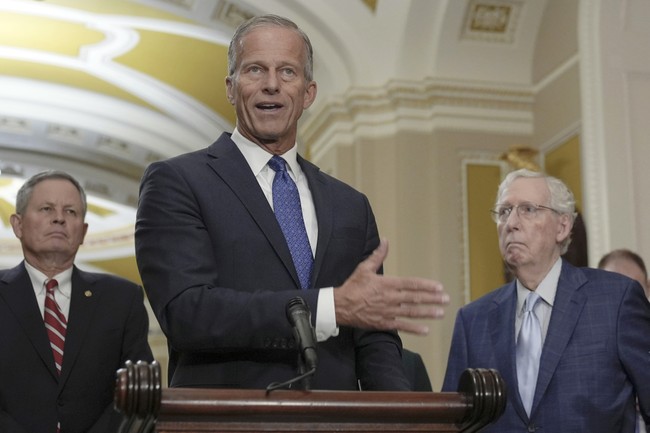
The Senate faces a high-stakes deadline next Friday as Republicans wrestle with President Trump’s demand to claw back $9.4 billion in previously approved spending, and cracks are showing in the GOP ranks.
Some Republicans are hesitant to cut any funding, others want to protect public broadcasting, and others are blasting their colleagues as addicted to “spending porn.” However, what’s clear is that this White House priority has become controversial in the Senate, and with slim margins, a lot more negotiating will have to happen.
What’s Happening
Congress has until July 18 to approve Trump’s rescissions package, which would yank funding from two main targets: $8.3 billion in foreign aid programs and $1.1 billion for the Corporation for Public Broadcasting that funds NPR and PBS. The House narrowly passed the measure 214-212 last month, with four Republicans defecting.
The action shifts to the Senate, where Majority Leader John Thune needs to hold together a 53-seat majority that’s showing strain. The package only needs a simple majority to pass, meaning no Democratic filibuster will get in the way, but several key Republicans are balking at specific cuts.
The Republican Resistance
Susan Collins (Maine), who chairs the Senate Appropriations Committee, has emerged as the biggest obstacle. She’s been clear about her objections to cutting the President’s Emergency Plan for AIDS Relief (PEPFAR), a program started under George W. Bush that she says has saved millions of lives.
“PEPFAR cuts make no sense to me whatsoever, given the extraordinary record of PEPFAR in saving lives,” Collins told reporters, highlighting the program’s track record in combating HIV/AIDS globally. In a committee hearing, she noted that PEPFAR “has saved more than 26 million lives and enabled 7.8 million babies to be born HIV-free to mothers living with HIV.”
Lisa Murkowski (Alaska) has also drawn a line in the sand. “I don’t support the rescissions package as it’s currently drafted,” she told reporters Wednesday, specifically citing concerns about PBS and NPR cuts that would hit rural Alaska hard.
Mike Rounds (South Dakota) is worried about Native American communities in his state. Rounds noted there are Native American reservations in South Dakota relying on radio stations that receive federal funding, and he’s been working to negotiate changes with the White House budget office.
The Conservative Push
Other Republicans are pushing hard for the cuts. John Kennedy (Louisiana) has been the most colorful advocate, calling the foreign aid spending “spending porn” that “triggers our gag reflex.”
“It is gut-check time. You either believe in reducing spending or you don’t,” Kennedy said on the Senate floor. “I think if the Republicans in the United States Senate do not pass the rescission package, after all the rhetoric about reducing spending, then they should hide their head in the bag, and I think the White House will provide the bag.”
Kennedy’s been particularly pointed about some foreign aid programs, citing examples like $833,000 for a contract to assist “transgender people, sex workers, and their clients in Nepal.”
The Procedural Reality
Thune appears optimistic about getting the votes but acknowledges the package will likely change. “I think that will hit the floor next week. Obviously, it’s a fairly open process and subject to amendment. So, we’ll see where it goes,” he told reporters.
The amendment process could be crucial. Senate Majority Leader John Thune told reporters this week the package would have an “open amendments process,” meaning senators can file unlimited amendments. Republicans would only need four of their own members to strip out controversial provisions, assuming all Democrats vote to preserve funding.
Thom Tillis (North Carolina) exemplifies the GOP’s internal struggle. “Right now, I’m lean yes,” Tillis told reporters about passage of the package. But he acknowledged that some Republican colleagues “have also made persuasive arguments in favor of protecting money for PEPFAR.”
House Speaker Mike Johnson framed it as a critical test. “Today’s passage of this initial rescissions package marks a critical step towards a more responsible and transparent government that puts the interests of the American taxpayers first,” he said after the House vote.
The White House has made clear this is just the beginning. Budget Director Russell Vought has indicated more rescissions packages are coming if this one succeeds.
What’s Next
All eyes are on the Senate floor next week, where Republicans will face a series of votes that could reshape the package significantly. If changes are made, the bill would have to return to the House for another vote—all before the July 18 deadline.
The outcome will signal whether Trump can count on congressional Republicans to support his cost-cutting agenda, or whether traditional GOP support for programs like PEPFAR and public broadcasting will prevail. For a party that campaigned on fiscal responsibility, it’s proving to be a more complicated calculation than expected.
Editor’s Note: The fight for rescissions is part of President Trump’s efforts to reshape government and make it leaner. This is the first of many packages IF Republicans can come together and reduce spending.
Help us continue reporting on Trump’s efforts to cut spending and halt the Democrats’ insane spending projects. Join RedState VIP and use promo code FIGHT to get 60% off your membership.













